I-TECH seconded staff work in collaboration with government officers and program managers, and bring technical expertise to efforts to strengthen health systems. Continue reading “Technical Support to the National HIV Response in Malawi”
Category: HIV Care and Treatment
I-TECH Ukraine Conducts In-Service Nurse Training Pilots for Achieving 90-90-90
Recent public health care reform in Ukraine has called for the growing role of primary health care, task shifting, and decentralization of HIV services while providing care and treatment for people living with HIV (PLWH). In June 2018, the International Training and Education Center for health (I-TECH) Ukraine conducted two back-to-back, five-day in-service training programs on HIV testing services for two cohorts of participants from twelve regions across Ukraine.
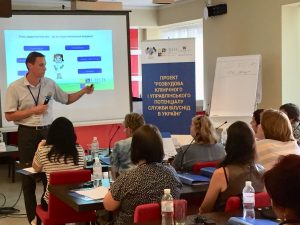
The concept and design of these unique pilot training programs were influenced by the recent reform to actively involve general practice/primary care nurses into the process of achieving UNAIDS 90-90-90 targets in Ukraine.
A group of 10 national HIV and health care reform experts, I-TECH’s international consultant-nurse practitioner, and the I-TECH Ukraine training development team carefully designed the learning objectives and content of the training program with consideration of the specifics of the national HIV epidemic, participant backgrounds, as well as anticipated task shifting. Together, these experts synthesized and presented international and national clinical and nursing best practices in the area of serving PLWH.
Training participants included nurses from primary care facilities, specialized HIV clinics, as well as faculty of seven local nursing colleges, including I-TECH Ukraine’s national partners – Ternopil State Medical University and the Nursing College of Poltava Ukrainian Medical and Dental Academy.
The training programs outlined roles for general practice/primary care nurses in achieving UNAIDS 90-90-90 targets, taught HIV basics, helped develop skills for HIV testing services with rapid HIV test kits, and coached participants on conducting counseling for PLWH using a non-discriminatory, patient-centered approach.
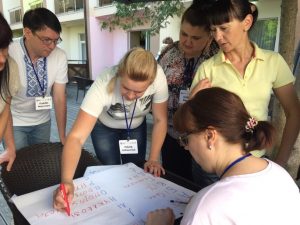
Facilitators used interactive training tools and approaches during the program to fully engage participants and strengthen the capacity of the nursing college’s faculty to teach up-to-date HIV content in an appealing and efficient way.
One of the central elements of the program was to educate the participating nurses about the challenges surrounding HIV-related stigma and discrimination with a major goal to overcome it in the nursing community and encourage respectful delivery of services for PLWH.
“[I-TECH Ukraine and its partners are] doing such a[n] important thing,” says Valentyna Borysova, lecturer of Zaporizhzhia Nursing College. “Educating nurses on HIV has been so much underestimated and under-invested in Ukraine.”
In addition to feeling as though this training addressed a critical gap in education, participants also provided positive feedback about the content and facilitation of the training, especially the parts of the training that were facilitated by the international and national peer nurses.
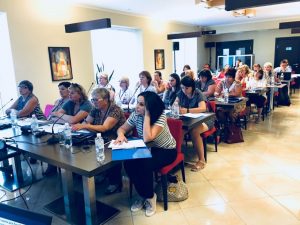
“The knowledge on testing and post-exposure prophylaxis are badly needed at our clinic,” says Liudmyla Samolelis, Senior Nurse of the Psychiatric Clinic in Poltava, Head of Poltava Oblast Nurse Association. “I plan to conduct an on-the-job training for the nurses, using the materials from the training.”
Due to the success of the pilot trainings, I-TECH Ukraine intends to finalize training materials, institutionalize the course through its local partners, and develop a manual that could be used in different training formats, including state-owned colleges and medical universities. In addition, an ambitious regional rollout of the training program is anticipated during the next year of the project.
I-TECH and Haiti Ministry of Health Present Research at CROI 2018

Nancy Puttkammer, PhD, MPH, presented a poster at the Conference on Retroviruses and Opportunistic Infections (CROI) in Boston on 4-7 March 2018. She was joined by Rose Boulay, a representative from the Haiti Ministry of Health (MSPP) National HIV Program (PNLS). Madame Boulay works on data quality assessment, training for clinical sites, and decision making using data from the iSanté electronic medical record (EMR) system.
The poster, titled “Multi-Month Scripting (MMS) and Retention on HIV Antiretroviral Therapy (ART) in Haiti,” reflected the collaboration between I-TECH and MSPP to analyze national policies using iSanté data from 85 ART clinics. They examined the MSPP-led MMS initiative to prescribe longer intervals of ART for stable patients. The goal of the MMS approach is to improve patient retention on ART by reducing the burden to patients of coming into the clinic monthly to pick up their ART prescription.
“Our analysis showed impressive uptake of MMS across all health facilities, suggesting that longer intervals are welcomed by providers and patients,” explained Dr. Puttkammer. “Patients prescribed ART for two months or more were 18% more likely to be retained, after adjusting for various patient and facility factors, compared to patients on monthly ART regimens. This is a promising result in terms of the goals of the MMS approach.”
Haiti’s national EMR system allows for the MSPP to conduct data analysis to evaluate the success of health interventions across the entire network of clinics and hospitals in a timely manner. “We are very pleased that we have been able use the iSanté data system to measure the progress of our national HIV and AIDS response, and to share our results with an international audience at CROI. It has been a great experience,” stated Madame Boulay.
I-TECH Shares Research at CUGH 2018

Representatives from the International Training and Education Center for Health (I-TECH) are headed to New York for the 9th Annual Consortium of Universities for Global Health (CUGH) Conference. The conference—held on March 16-18, with satellite sessions on March 15—will be co-hosted by Columbia University, Stellenbosch University, and the University of Peradeniya.
Featured speakers include Richard Horton, Editor of The Lancet, and Natalie Kanem, Deputy Executive Director of the United Nations Population Fund.
Building on the theme of “Health Disparities: A Time for Action,” staff and faculty from I-TECH will be presenting on the following topics:
- King Holmes, MD, PhD, founding chair of the Department of Global Health and a co-Principal Investigator of I-TECH’s IAETC award, will join a morning plenary session and discussion about global health disparities. The discussion will be moderated by Director of the Fogarty International Center Roger Glass. Dr. Holmes will be joined for the discussion by Rose Leke, Gairdner Foundation Global Health Committee member and Emeritus Professor at Universite de Yaounde, and K. Srinath Reddy, President of the Public Health Foundation of India.
- Kate Wilson, PhD, Clinical Assistant Professor, is presenting a poster titled “Evaluation of a New Field Epidemiology Training Program (FETP) Intermediate Course to Strengthen Public Health Preparedness in Tanzania.” The locally adapted course significantly improved trainee knowledge and skills in field epidemiology, and the evaluation also showed evidence of improvement in data quality and performance at trainees’ workplaces and districts.
- Lindsay Mumm, MPA, Program Manager, is presenting a poster titled “Creating Relevant Change towards Reaching the UNAIDS 90-90-90 Target with High-Impact Leadership Training – Afya Bora Fellowship in Global Health Leadership.”
In addition to the research being shared at CUGH, I-TECH was represented earlier this month at the Conference on Retroviruses and Opportunistic Infections (CROI) in Boston. Nancy Puttkammer, PhD, MPH, presented a poster titled “Multi-Month Scripting (MMS) and Retention on HIV Antiretroviral Therapy (ART) in Haiti.” The retrospective study used data from the iSanté electronic medical record system in Haiti and found promising results that MMS for ART in virally suppressed patients improved retention and engagement in treatment.
About CUGH
The mission of CUGH is to build interdisciplinary collaborations and facilitates the sharing of knowledge to address global health challenges while promoting mutually beneficial, long-term partnerships between universities in resource-rich and resource-poor countries, developing human capital and strengthening institutions’ capabilities to address these challenges. Read more about CUGH: https://www.cugh.org/.
About CROI
Established in 1993, The Conference on Retroviruses and Opportunistic Infections (CROI) was provides a forum for scientists and clinical investigators to present, discuss, and critique their research. The goal of the conference is to provide a forum for researchers to translate their laboratory and clinical findings into tangible progress against the HIV pandemic. Read more about CROI: http://www.croiconference.org/.
HIV Positive Teens in Namibia Gather for Weekend of Fun and Support
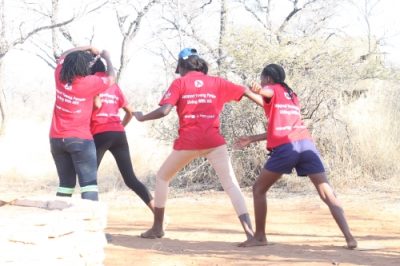
All teens need consistent opportunities to build self-worth, explore their gifts, and feel the support of peers and adults. For teens who are HIV positive, the everyday pressures and fears of adolescence (rejection, bullying, gossip) can be amplified, making these opportunities especially important. In Namibia, adolescents and young people, especially girls and young women, continue to be disproportionately affected by HIV.
In response to these realities, in late August, a three-day Teen Club Retreat was organized by the Katutura Hospital Paediatrics Communicable Disease Clinic (PCDC) team, in collaboration with B2Gold, Champions for Life, and the International Training and Education Center for Health (I-TECH).
Fully funded by B2Gold and hosted at its Otjikoto Mine Nature Reserve, the retreat included 49 teens from the clinic (31 girls and 18 boys), who were joined by clinic doctors, nurses, and counselors as well as facilitators from Champions for Life, a psychosocial-spiritual program for children, adolescents, and young adults with the challenges of being infected or affected by HIV.
Through team exercises, game drives, inspiring films such as “Hacksaw Ridge” and “The Soul Surfer,” lectures, and small group sessions, the retreat aimed to:
- strengthen bonds and networks;
- create enthusiasm about the future;
- develop self-respect;
- instill the values of a healthy environment, teamwork, and responsibility; and
- keep teens engaged in care.
“I enjoyed the movies, as they motivated me. I realized that I am not the only one facing challenges. When I courageously tackle my challenges, I remain strong even if I may not win them all.” – Teen Club member
I-TECH Namibia’s Sharon Mambo, an HIV Pediatric Expert Nurse, served as a chaperone and as one of the key organizers of the retreat. Mambo led a discussion on the importance of treatment adherence and viral load suppression. In addition, she tasked one of the teens with facilitating a discussion on “transitioning,” the process during which adolescents move from paediatric HIV care to more independent adult care. At Katutura hospital, this means accessing health services at an adult ART clinic.
Addressing the teens’ fears of waiting too long for services and meeting unfamiliar faces, Mambo assured the group that a specific health worker has been assigned to work with them and they would be “fast tracked.”
“It’s a matter of changing consultation rooms when you transition to the adult clinic,” said Mambo. “You will still meet the happy, friendly staff on the other side, so lay your worries aside.”
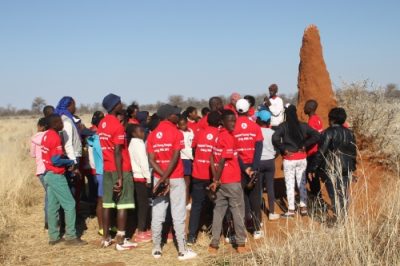
Highlights of the retreat also included a tour of the B2Gold mine and a game drive, where the kids were thrilled to see reserve animals including giraffes, springboks, wildebeests, and zebras at close range. “I got to see some of these animals for the first time,” said one teen. “I never knew that some animals could be as clever as human beings.”
The team from Champions for Life also held a full-day seminar titled “NICHE,” focused on self-image, identifying gifts and abilities, and creating one’s vision for the future. This was done through music, dance drama, group presentations, and poetry.
“I enjoyed the team-building activities because we got to work as a group and had the opportunity to come up with ideas together as a team.” – Teen Club member
“A major success of this trip was the close bond, mutual respect, and trust that developed between the staff and adolescents during the three days,” says Mambo. “The shared experience and willingness of the staff to participate fully in all sessions of the program really lowered some of the barriers and discomfort that normally exist between teens and adults.”
Mambo has also been working with teen leaders from the group to support other facilities in Windhoek to establish their own Teen Clubs.
Stefan Wiktor

Stefan Wiktor, MD, is a physician with more than 25 years of experience in epidemiologic research and public health programs related to the control of infectious diseases. He leads I-TECH’s work on hepatitis prevention and control, and is Acting Professor in the Department of Global Health. Prior to joining I-TECH, Dr. Wiktor was the Team Lead of the World Health Organization’s Global Hepatitis Programme.
Dr. Wiktor previously worked at the U.S. Centers for Disease Control and Prevention (CDC) where he conducted research studies of HIV-1 and HIV-2 in Cote d’Ivoire, West Africa, and led a large-scale HIV/AIDS prevention and treatment program in Tanzania. His research showed that anti-retroviral medications were effective in preventing mother-to-child HIV transmission. Other research he did proved that antibiotics reduced bacterial infections in HIV-infected adults, a finding that led to the WHO recommendation for use of antibiotic prophylaxis to prevent deaths in HIV-infected adults.
Program Highlights
Innovative Training Models in Tanzania
I-TECH Tanzania has implemented many pre- and in-service training initiatives and materials, as well as adopted TrainSMART. Continue reading “Innovative Training Models in Tanzania”
Differentiated HIV Service Delivery Models in Tanzania
In October 2016, the Government of Tanzania adopted the World Health Organization’s (WHO) Treat All recommendations. The adoption of WHO recommendations, coupled with the Government of Tanzania’s acceptance of the UNAIDS 95-95-95 targets represents a significant commitment to the fight against HIV in Tanzania.
Continue reading “Differentiated HIV Service Delivery Models in Tanzania”
Improving HIV Care and Treatment across the Caribbean
I-TECH supports a variety of activities aimed at improving HIV care and treatment in the Caribbean region, such as on-site clinical mentoring, development of training curricula, and providing clinical support materials to improve care and treatment for HIV/AIDS in the Caribbean region.
Continue reading “Improving HIV Care and Treatment across the Caribbean”
eLearning Programs in the Caribbean
I-TECH has partnered with universities and ministries of health (MoH) in the region to develop accessible in-service training opportunities for HIV providers using distance and blended learning.